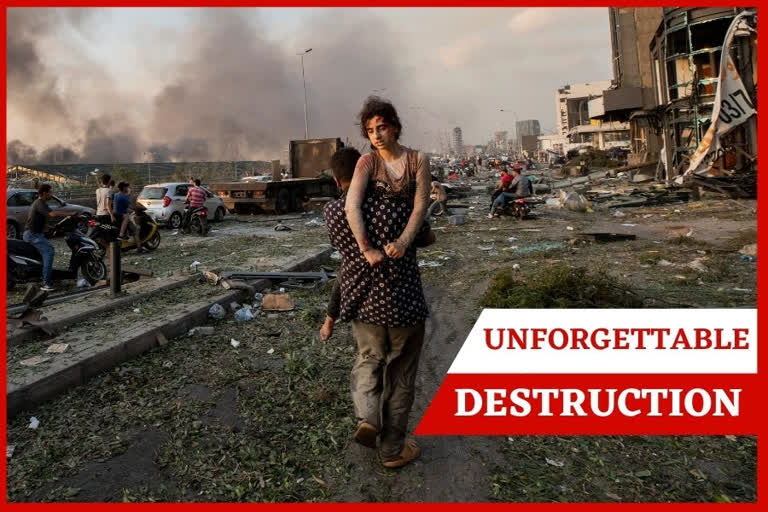Jiyyeh: When Mustafa Kinno felt the ground shake and heard the deafening blast toward the port, he frantically called his brother living nearby.
No reply. He tried a neighbour, who said the family was sitting outside their apartment across from the port when it exploded. Terrified, Mustafa ran more than two miles (four kilometres) to his brother, glass crunching under his feet.
When he arrived, first he spotted his niece Sedra’s head poking out of the rubble. He collapsed and crawled toward her but couldn’t move her. Then he found his younger niece, Hoda, slung her over his shoulder and started walking.
An image of the two, captured by Associated Press photographer Hassan Ammar, has come to symbolize the devastation of the August 4 blast at the Beirut port, which took 193 lives and wounded 6,500. In the photo, a dust-covered Hoda, 11, holds her body stiffly against her uncle’s shoulder, a gash bleeding from her forehead, eyes half-closed and face set in a grimace.
The story behind the photo reflects the particular pain of Syrian refugee families like Hoda’s. At least 43 Syrians were among those who died in the explosion, plunging a war-weary community into further misery. Lebanon now hosts nearly one million Syrian refugees about one in five people.
“It was always bad even before the explosion, but we were getting by,” said Mahmoud, the girls' older brother. “Now, life is unbearable.”
It wasn’t supposed to be this way.
Read more:Lebanese army finds tons of ammonium nitrate in Beirut
Ali Kinno, 45, moved from the Aleppo region of Syria to Lebanon in 2008 to find work, determined to provide a better life for his family. The residential tower facing the port was still under construction then, and he soon got a job as a concierge.
In 2011, after Syria’s civil war erupted, he fretted for his family’s safety. A year later, after northern Aleppo became a frontline, he asked them to join him in Beirut, the capital of Lebanon.
But the family never quite settled there. Syrian refugees faced resentment and discrimination his daughter was harassed on the street, and his sons found it increasingly difficult to get jobs, he said. The situation got worse as the country’s economic crisis set in, culminating in a local currency collapse.
Ali was so protective and scared for his children, especially the two girls, that he didn’t let them go to school, despite Sedra’s pleas. Cooped up in their tiny apartment, the children grew closer. The girls became inseparable. Because their mom suffered back pain and asthma, they took care of the apartment, especially Sedra.
“She cooked, made tea, she looked after her younger brother Ahmad, gave him his bath. She was everything,” said Ali’s wife, Fatima, choking on the last sentence.
It was just after 6 pm on August 4 when Ali Kinno asked his son Qoteiba to turn off the generator which provides electricity to their 20-floor residential building. He also asked 15-year-old Sedra to prepare the tea.
It was that time at the end of the day when the sun begins to soften, and Ali and his family sit outside the building where he works as a concierge, drinking tea and watching the highway that runs parallel to the port. Only this time, smoke was pouring out of the facility.
Sedra brought the tea and put it on a small table but didn’t pour it the family was animatedly discussing the pink-tinged smoke. The flames grew bigger, and the fire began making popping sounds. A convoy of red fire engines, sirens screaming, zipped past on the highway.
Alarmed, Ali’s wife called for them to go inside the apartment. That’s when they heard the first explosion. But it was the second blast seconds later that seemed to lift the earth under the port and throw it in their direction.
“It was as if the port came to us,” says Ali.
Also read:FBI team to arrive Beirut to probe massive blast
In a flash, the middle-class neighbourhood housing the headquarters of one of Lebanon’s most famous fashion designers turned to hell on earth, tossing everyone and everything in the air and showering them with debris.
“Tiles, stones, aluminium, glass. Everything fell on us,” said Ali, who suffered a brain haemorrhage, several broken ribs, loss of vision in his left eye and damaged hearing in his right ear that day.
